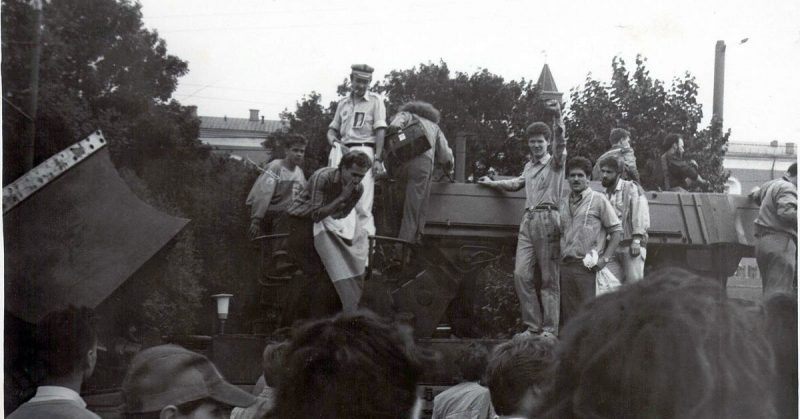On Friday, several dozen Russians came together for a protest reunion marking the 25th anniversary of an attempted coup that spelled the end of the Soviet Union. Although considered by many to mark the birth of the modern Russian Federation, it is a holiday that the Russian regime chooses to ignore due to its anti-establishment, pro-revolutionary nature.
Eight communist leaders seized power from Soviet leader Mikhail Gorbachev on Aug. 19, 1991, saying he was ill. In actuality, he had been placed under arrest by the plotters. Thousands of protesters took to the street to protest against the coup and the draconian powers of the Russian security services.
This failed attempt to seize power from the legitimate government caused a backlash that ultimately led to the dissolution of the Soviet Union and the end of the Cold War.
It was outside the Russian White House, a vast government building in Moscow, that thousands of demonstrators gathered in defiance of the coup. For the next few days, protests erupted across the city, and the streets were filled with demonstrators.
Most of the several dozen participants of the modern-day reunion were elderly or middle-aged, some carried Russian flags and photos from the event in 1991.
“This flag-waving patriotism as if things are so great right now.” This was a quote from Lyudmila Skryabina; she makes the trip from St. Petersburg to Moscow every reunion. She is disappointed in the new political regime but is very proud of standing at those makeshift barricades 25 years ago.
Moscow city hall refused to give permission to the participants when they asked to march from the White House to the tunnel where three protesters were killed in what was otherwise a bloodless coup. The events were organized by the grass-root movement and a group that was established to honor Boris Yeltsin.
During Yeltsin’s presidency, from 1991 to 1999, there was always a government presence, and flowers at the burial site of the three protesters who were killed. “Now every time I come here I call my friends and ask: Are they going to allow us at all?”
The government as cracked down on public gatherings in recent years. Dozens of people were sent to prison for minor offenses while participating in the opposition rally to Putin’s inauguration.
The events of August 1991 are rarely (if at all) mentioned in the media, leaving the newer generations ignorant on the subject, while many that opposed the coup have become disillusioned with democracy. Only about 50 percent of the Russian population could identify what happened on Aug. 19, 1991, a survey by the authoritative Levada pollster says.
Analysts say that, although Vladimir Putin was a staunch ally of the anti-coup mayor of St. Petersburg, Anatoly Sobchak, his past as a KGB agent prevents him from honoring this important event.
Many of those who came out to commemorate the coup were critical of Putin and the modern Russian government.
“Aug. 19-21 could have become a symbol of a new Russian state,” Pavel Aptekar said. “The three August days of 1991 remind the establishment that people could disobey their orders and hold the government accountable. In the past 25 years, the government has transformed into one that is appalled by the very possibility.”
An opinion piece published by Kremlin-friendly Moskovsky Komsomolets daily, entitled “25 years Since the Loss of Freedom,” shows an illustration of a hand emblazoned with a KGB symbol wrestling a Russian flag away from a group of people.
“August 1991 brought about a stunning wave of enthusiasm, you felt there was no mountain high enough,” Alexander Minkin wrote. “Those who had power and a unique historical opportunity dropped in their lap turned out to be unworthy: they stole and drank the country away, the country and its future. And this still goes on.”
(())
